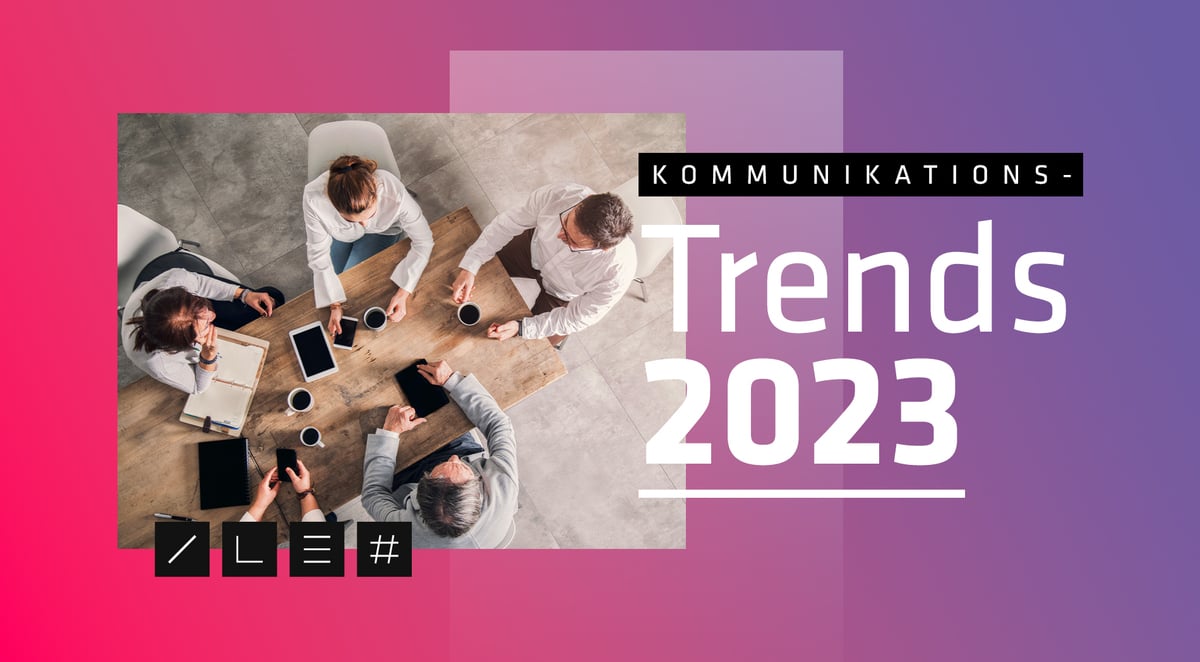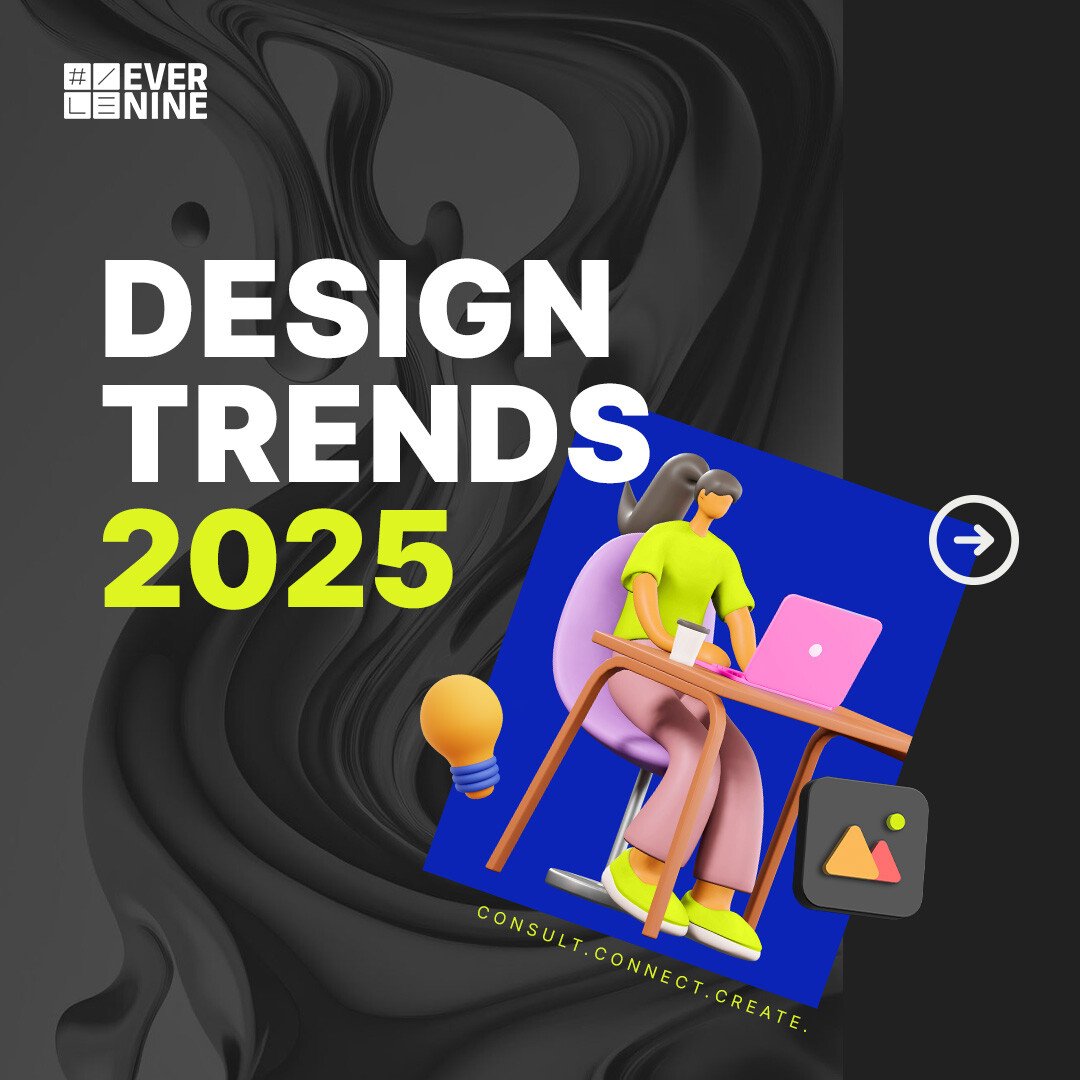
From brand loyalty to the “revolution of speech”: Evernine Group - these are the top 5 communication trends for 2023

There is a lot of buzz in the digital marketing market at the moment, and marketers also have a number of tasks on their plate for 2023. The Munich-based communications consultancy Evernine sorts out the most important topics here and presents the five communications trends for 2023 that communications managers will not be able to avoid.
The world is on the move. This also has an impact on marketing, PR, sales and all communication managers in companies. The multi-award-winning innovation and communications consultancy Evernine Group has therefore identified the five trends for 2023 according to its full-service portfolio that communications managers should definitely take into account in order to keep pace with the competition or even stay one step ahead.
The five trend topics that will be particularly important in 2023:
1. Brand Loyalty Marketing
A strong brand was and is more than ever crucial for companies to give customers and partners the necessary trust, loyalty and an authentic value proposition. And in an increasingly complex digital and political world, strong business relationships are becoming ever more crucial. However, new topics will be added in 2023. Customers, partners and even applicants are demanding answers to the topics of CSR (Corporate Social Responsibility), sustainability and inclusion more vehemently than ever before. Companies, whether in the B2B or B2C environment, are being asked to position themselves clearly - and to communicate this just as clearly! No wonder that some marketers have already started to replace the traditional meaning of B2B or B2C with B2H (business to human). But what is brand loyalty marketing all about?
Brand loyalty marketing deals with the challenge that customer loyalty, which is becoming increasingly important, must play a role in absolutely all areas of the company. This includes everything from PR activities, website content and HR communication (internal and external) to product campaigns. Possible critical questions posed by the company's increasingly scrutinizing and enlightened customers should be considered in all areas and answered as specifically as possible. As mentioned at the beginning, this primarily concerns issues in the areas of sustainability (such as the company's CO2 consumption), CSR (Corporate Social Responsibility), logistics and delivery as well as inclusion and equality. And it is not only customers and partners, but also applicants in particular, who have questions relating to the company's much-described purpose.
“Especially in more complex times, leadership through trusted brands that convey closeness and values is more important than ever. That's why it will be immensely important in the near future to strengthen communication with creativity and a dose of patience,” says Sven Blaukat, Director Strategy Consulting at Evernine. “Decisions will be made more consciously, purposefully and sustainably than in the past. This is where strong brands benefit. Where answers - which don't always have to be perfect, by the way - are lacking, medium-sized companies in particular will come under competitive pressure.”
2. Social Independence
There has long been no question that social media is also indispensable in the B2B environment in order to reach potential new employees, strengthen business relationships and place products and services in a targeted manner. A lot will happen in the field of social media in 2023, that much is certain. Whether it will be a possible complete restructuring of Twitter, whether the metaverse will turn out to be a bubble, whether channels such as Instagram will increasingly offer B2B services, whether completely new channels such as Reddit will suddenly appear or whether the giant Facebook will lose relevance after all, we don't know exactly. What we do know, however, is that in 2023 it will be urgently necessary to develop a central strategy in order to then transfer this to the individual channels, where it will be necessary to experiment with what works best for the respective company.

“Social independence means identifying four to five core topics for your own business, strategically bringing them together centrally and then transferring them to the individual social media channels,” explains Charlotte von Braunbehrens, CHRO at the Evernine Group. “Long-term KPI dependency is certainly becoming less relevant than short and medium-term successes that need to be achieved. On the one hand, this contradicts previously defined approaches in terms of campaigns, but on the other hand, it does not change the existing challenge of making all employees fit in the area of social media.” In order to remain agile and independent in the area of social media, a central content hub, for example, through which the previously defined core topics are played out, offers the optimal content and technical basis for reaching new and existing peer groups with creative offers. If the structure is right, they serve as the basis for unique social media activities that can significantly set you apart from the competition. The right choice of channel for the previously defined communication strategy is also crucial here. Is TikTok really the right channel for HR activities or do you as a company just want to be present there because everyone is doing it right now? It is important to define an authentic strategy together with the corporate communications management and to focus on realistic goals. And not according to the waterfall principle, but according to agile tactics.
3. Digital Me
Of course, companies have long been aware that employees are relevant to corporate communications. What will be new in 2023, however, is that measurable and sustainable social media success will increasingly and perhaps even overwhelmingly be achieved via employees and will therefore play a decisive role in the context of all other social media activities. In order to successfully establish this in the company, it is no longer enough to “just” train employees in the area of social media. Instead, they need to be intrinsically picked up and taken along on this journey. The Evernine Group agency calls this “Digital Me”.

This means combining the personal and career-related interests of individual employees in social media development with the company's overarching goals. These could be topics such as sustainability or CSR, for example, which employees would like to become more involved in. Or a more product-oriented approach that allows employees to position themselves as experts or social ambassadors for the company. The orientation of the individual “digital mes” is highly individual and must be worked out and sharpened for each individual in advance. Companies should increasingly recognize that the key to successful social media integration lies with the individual employees, who may and even must contribute their own individual goals and wishes in order to maintain authenticity. Demanding social media activities for the company per se, regardless of individual personalities, will no longer be enough in 2023.
“We have been working with companies for some time now to turn their employees into social ambassadors and use them to integrate successful social selling and turn business influencers into communicators. Our workshop series have demonstrably led to a change in thinking and the aim for 2023 is to continue the trend and integrate it into corporate strategies in the long term.
This means that if companies and business decision-makers are equipped with the necessary encouragement, the next level must be: Nurturing,” says Tobias Massow, CCO & Partner at Evernine. “We have seen that companies have understood that they need to communicate. What's missing now is the right strategy! The personal interests of social ambassadors must be linked to the interests of the company.”
4. Revolution of Speech
2023 will see a revolution in digital marketing that many corporate communications managers have certainly not yet had on their radar, because the corporate language in marketing & co. is facing a new digital majority: the millennials. And they have their own expectations in order to be activated, whether as consumers or applicants. It is often overlooked that a new internet generation, born between 1981 and 1995, is now the loudest on the web - especially on the professional web - and is increasingly creating opinion leaders - whether in social media on the customer side, in applicant forums or on the intranet. Millennials have completely new expectations of language, content and storytelling. These are expectations that break with old standards.

The opinions currently emerging on the web are breaking down old marketing and PR traditions. Millennials expect a lot, but they no longer expect perfection. They expect honest answers to their questions that arise with the respective topic, product or brand. They are concerned with questions such as transparency, purpose and, increasingly, inclusion. They have no problem with “denglish”, shorthand or even inconsistency. Everything no longer has to fit together, but something should always follow. Millennials appreciate moving images, provocation, exaggeration and metaphors. If you want to do justice to this new, majority digital clientele, it is not enough to simply adapt the language a little. Communication managers need to think about finding new standards for internal and external communication.
“Corporate communication - both internally and, above all, externally - often strives for exaggerated perfection,” says Stefanie Langhans, Head of PR & Publishing at Evernine. “However, companies need to come to terms with the fact that this change, this revolution of speech, is happening for real at an early stage and put their own corporate language to the test - for example in workshops or creative meetings. Otherwise, the relevant peer groups may no longer be reached. This can be the decisive sticking point, especially in the war of talent.”
5. Target Groups Repositioning
As with the “Digital Me” trend, the aim in 2023 is to take an existing topic further and raise it to a new level so that it can also become a trend. The link between marketing and sales is crucial for the company's success, as those responsible are well aware. However, in order to do justice to the new buyer groups in the market, the topic has taken on a new urgency. What is meant by target group repositioning here is that classic funnel marketing is increasingly reaching its limits. The typical interfaces between marketing and sales are no longer sufficient to remain competitive. Both departments are now required to completely reorganize conventional approaches.
One example of this is the processing of prospective customers acquired through marketing activities. Whereas in the past, telephone calls were made or classic nurturing processes were initiated, which usually took place separately from marketing, other approaches are required today. However, there is often a lack of suitable tools and, above all, the right strategy. This is the challenge for 2023, because while many briefings for sales managers and tele-sales agencies still look like the classic “preconfigured leads” with a fixed approach, it is much more promising to present yourself with your own sales story based on data enriched with social monitoring and social listening. Special tools and CRM systems that can provide and record GDPR-compliant social selling information are already being used in modern agencies for target group repositioning. As a result, target companies are clustered in a meaningful way and individual approaches are optimized with the help of smart services. A task in which marketing can provide excellent support. And must.
Another area in which repositioning is necessary is the frequent lack of agility that is required in all areas of corporate communication today, for example when it comes to topics such as crisis communication or customer loyalty (see 1.). “In order to find new communication interfaces and optimize them across departments, existing silos must be broken down even further and classic process flows must be rethought. One answer to this lies, for example, in the introduction of agile data systems to make sales, marketing and HR activities measurable and therefore analyzable,” summarizes Tobias Lilienthal, Head of Sales Excellence at the Evernine Group. “This analytical and data-based communication strategy not only enables budgets to be optimized and efficiency to be increased, but also gives companies a clear competitive edge beyond 2023.”
In 2023, corporate communication will not only become increasingly digital, but also more complex and will therefore require a special mindset combined with “best of breed” expertise. The Evernine Group supports companies as a trusted partner for new-generation corporate communications.




